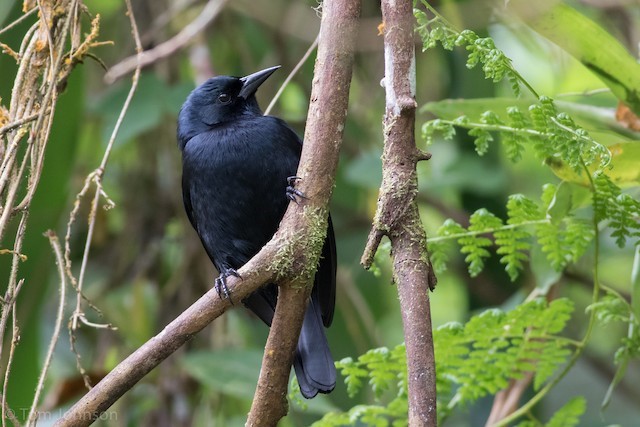Local and overseas environmentalists have joined forces to save the island’s most endangered species of bird — the Jamaican Blackbird.
Scientifically known as Nesopsar nigerrimus, the Jamaican Blackbird is also called wine pine sergeant and is said to be found in deeply forested areas. The creature, one of Jamaica’s 28 endemic species of birds, is believed to feed on insects found in wild pine trees and prefers higher elevation woodlands.
An action plan was recently proposed and developed with the help of local players and international NGO Re:wild during a workshop, president of Wildlife Jamaica Damion Whyte told the Jamaica Observer. The workshop was sponsored by the Critical Ecosystem Partnership Fund (CEPF) and featured representatives from the Forestry Department, National Environment and Planning Agency, Jamaica Conservation Development Trust, the Maroons and other stakeholders from the Cockpit Country.
“Bird experts met to come up with a plan on what we are going to do to prevent the bird from being extinct,” said Whyte.
Whyte said that the first step in their action plan was to conduct intensive scientific studies, as very little information is readily available about the creature. Monetary assistance has also been pledged by the CEPF to support the implementation of the action plan.
“We don’t know basic ecological stuff about the bird…we need to know more stuff about the habitat, what it really eats in the wild pine where it is found. We don’t know if the population is mixing — if they are not mixing, we could have some inbreeding going,” he said.
Noting that the Jamaican Blackbird can be found in the Blue and John Crow Mountains, Cockpit Country, Portland Bight Protected Area, among other marine parks, Whyte said, “Birds like this are what we call an indicator species, so based on the areas that you find them, they let you know that the forest is good”.
He stressed that the Jamaican Blackbird is visibly different from the blackbirds seen on electricity lines and around towns as its lumage is all black, its tail is short, and the bill is moderately long and slim.
In the meantime, Whyte’s concerns were very evident as he pointed out that the bird’s habitat were at stake, thus increasing its risk of extinction.
“Because it is a forest specialist, and we have few areas that have good forests, it is restricted to these areas and their numbers are very low so they are at a high risk of becoming extinct,” he told the Sunday Observer.
“Then we have another threat where people chop down the forests. When you replant a tree it takes some time for the wild pine to grow back, so what do they eat during this time? We don’t know, so we came up with this plan of action for what we think we can do in the next five years to ultimately protect the birds,” said Whyte, who is also a biologist.
In addition to habitat loss caused by farming and development, the extinction threat has increased with climate change. In 2020 the International Union for Conservation of Nature (IUCN) Red List of Threatened Species — the world’s most comprehensive information source on the global extinction risk status of species — reported that the Jamaican Blackbird population was decreasing.
According to IUCN, the global authority on the status of the natural world and the measures needed to safeguard it, while “the population is estimated to number 2,500 to 9,999… based on an assessment of known records, descriptions of abundance and range size”, there were between 1,500 and 7,000 Jamaican Blackbirds across the country’s forests.
Noting that the species is not migratory, the IUCN Red List further stated that there are several threats to the bird’s existence such as wood and pulp plantations, resident and commercial development, wood harvesting, and mining.
At the same time, Whyte told the Sunday Observer that plans are in place to implement a monitoring programme for the bird, similar to what is being done in the Blue and John Crow Mountains. Additionally, Whyte said, there is an obvious need for a public awareness campaign on the importance of the Jamaican Blackbird to the ecosystem and that is also in the pipeline.
“We are also going to implement a plan where citizens take pictures if they see them…or if somebody sees a nest, so we are going to get the people involved. The next thing we want to do is find a way to get the public to know about the Jamaican Blackbird because everybody sees all kinds of blackbirds and they don’t know about it,” said Whyte.
Caribbean Alliance Director at Re:wild Dr Jenny Daltry told the Sunday Observer that she is optimistic about the plans being made to save the species of birds. Dr Daltry explained that Re:wild, co-founded by Hollywood actor Leonardo DiCaprio, has pledged to work closely with Jamaican environmentalists, whom she pointed out are very educated in the field.
“I work around the world and many other Caribbean countries, but I am just blown away by the expertise here in Jamaica. I am very optimistic that the country can actually ensure the continued survival of this amazing bird,” said Dr Daltry.
“I’m hoping to keep in touch and help support the partners here so we can implement the plan and make sure this amazing bird in its habitat doesn’t get lost because that would be a real tragedy for the country and the world,” she added.
Dr Daltry noted that while she, too, is unfamiliar with the Jamaican Blackbird, the information presented by local environmentalists points to a need to preserve the forest and in turn keep the birds alive.
“I learned a lot. This species is not one I know very well. It is very unique and it only survives in real mature old forests. That is related to the reason why it is disappearing because forests are declining or becoming degraded in Jamaica,” Dr Daltry said.




